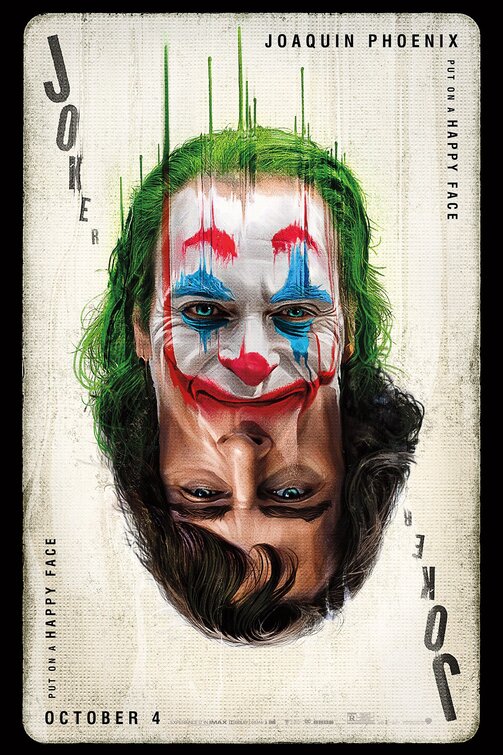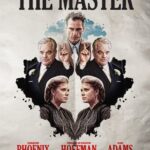Put On A Happy Face
Director
Todd Phillips
Starring
Joaquin Phoenix
Frances Conroy
Zazie Beetz
Robert De Niro
Brett Cullen
To read this review may bring about some confusion in the sense that the ratio of criticism will not reflect the final score; this is largely due to the fact that I have awarded this movie a high rating but will spend the entirety of this word count banging on about two specific frustrations in great and meandering detail. But I should highlight that the majority of this release, the cinematography, production design, the incredibly deep score work, is a marvel and genuinely engrossing cinema. Unfortunately, there are just a few significant points that need to be addressed.
The film opens in early 80s Gotham, where we are introduced to Arthur Fleck [Phoenix], a meek, timid clown-for-hire who lives with his mother and clearly suffers from several mental health issues. As the cruel city around him chips away at the few remaining pillars of his stability, Fleck descends into a self-destructive collapse before evolving into a confident nihilistic killer.
There are infinite merits to homage and imitation in cinema. They can be used to draw beautiful contemporary parallels, take established concepts and run further with them or flip them on their head entirely. It is undeniably and brazenly clear that Joker is an effective recreation of key components from both Taxi Driver and King Of Comedy – which the film makes no attempts to hide, going so far to include Robert De Niro among its supporting cast – and without prior knowledge of these releases, Joker earns an initially impressive air of maturity, intelligence and depth. But while the aforementioned Scorsese movies had insightful narratives, Joker is surprisingly base, existing mostly as a surface-level character study with hints of social commentary but never truly picking up these themes that have been so expertly used in the past and running with them.
This then started something of an existential calculation in my mind; specifically focusing on the question of does a film fundamentally need to say anything to be good, can it not simply be a character study? Does Joker merely present nihilism for the sake of nihilism ending up saying nothing? There will, of course, be discussions about how this movie reflects contemporary society to a degree, surrounded by subliminally influential headlines that say “kill the rich”, addressing the state of mental health neglect, presenting a growing air civil unrest and tension and tabulating factors that lead to mass shootings and other acts of disenfranchised domestic terrorism. But as much as this feels like a film that projects the plight of our time onto a past setting, in actuality, all it does is takes a decent but cinematically familiar unhinged, voiceless individual and slaps the joker face-paint on him. Once the MCU first gained real traction and success, it was evident that cinema was going to inadvertently adopt a lot of comic book tropes and trappings. We are now at the state of the standalone, the elseworlds tale that does not exist within the established universe of the franchise; which, ironically, is how cinema has functioned, outside of serialisation, for a century. To my mind, this film exists in the same way that Netflix’s Daredevil does; it can be seen as a darker, subversive tale with a character that will likely reappear in a different form in the near future but that shouldn’t detract from what has been achieved therein. Having said that, Daredevil took its time to cultivate complex characters, storylines and universe building, whereas Joker focuses solely on that first point.
Which brings us to the nature of the Joker himself. I harbour a point of contention when it comes to praise for the Joker predominantly because of a misconception about the role. All too often the mysterious clown prince of crime is heralded as the greatest villain of all time, even the greatest character of all time, with the most memorable and shocking performances. This is, frankly, bullshit. The truth is, anyone can play the Joker. As an incredibly broadly drawn blank slate, littered with ambiguity, the portrayal is easy to do because no matter how over the top or subdued, it still sells the character. That’s why there may be iterations that people favour but each one holds merit in its own way (yes, even Jared Leto, whose neon gangster persona spoke to many people and fit the setting he found himself in, even if I personally didn’t care for it). This is because the Joker is a lens to magnify an actor’s uninhibited heights; a way to say “be as big as you can then go another 10%” which, let’s be honest, is what most actors desperately love to hear. The difference here is that Phoenix is an exceptionally talented individual and brings to life an incredibly strong, layered performance, from the physicality and uncontrollable (almost painful) laughter, to the left/right hand switch in his journaling and his eventual transition to confident superstar villain. It is, quite frankly, impossible to fault Phoenix in this movie, he is undeniably flawless and the film is worth seeing for this masterful unstable shift from weak to empowered.
In the Marvel/Sony collaborative version of Spider-Man, there is no visible Uncle Ben origin. The MCU assumes and ultimately relies on audience preconceptions and prior knowledge of the franchise. This is something that I feel is a bit of a failing point because without seeing the formative moment that defines the character and his quest to become a hero, we latch onto other superfluous or secondary motivations. Similarly, this franchiseless tale can’t escape Batman. It wasn’t enough to simply tell a Joker origin story, we had to tie it in to a character who is completely irrelevant to this feature, for whom there will be no tie-in, crossover or follow-up; like the cameo from Richard the Lionheart at the end of Kingdom Of Heaven, it appears solely as a wink/nod/in-joke to audience members in the know (which is arguably everyone). But while Bruce is a fairly non-existent, silent character in this release, we are treated to an alternate look at his father, Thomas Wayne [Cullen]. Here, Wayne is shown to be both a caring and dispassionate individual, the kind of 80s republican “pull yourself out of poverty” individual who wants his city to thrive but doesn’t want to get his hands dirty in the process. He’s also the closest thing we get to humanising the opposition. But we never see the life of the rich other than Fleck’s perspective – meaning we don’t have a clear understanding of who to sympathise with; the serial killer clown or the sucker-punching thugs? This lack of coherence means the film closes on chaos and riots in the streets but we witness similar riotous upheavals happen in The Dark Knight Rises but we weren’t supposed to sympathise with Bane and without the juxtaposition of a Batman, we don’t have anyone to say “you’re wrong” and the only one who does gets a bullet to the face and chest. But that’s the fundamental problem with nihilism used as an artistic expression, if nothing matters, what conclusion are we supposed to form? Pair that with an unreliable narrator and there is the ambiguous question of whether anything shown in the film actually happened or not.
In addition to my issues with the nature of the Joker and the use of homage/imitation, there are a handful of other minor things that crop up the more one scrutinises this feature. Things like Joker actively saying he isn’t political before giving a political statement and performing a public execution, that he doesn’t acknowledge he’s a symbol before becoming that very thing and relishing it, what’s more the film attempts to operate above the mainstream superhero offerings, looking on them with a level of disdain, while being put out by the mainstream and finding itself in the familiar trench of depicting Thomas and Martha Wayne dying in an alley with those fucking pearls flying in slow motion. And then there’s the end, a dream-like sauntering but before that it feels like the movie can’t decide which final image it wants to settle on, giving us a Lord Of The Rings style conveyer belt of powerful images that could easily close the movie.
As stated at the start of this review, despite my harsh and pessimistic tone, I very much enjoyed this film and think it deserves a great deal of praise for what it has accomplished and committed to screen. Within this feature is a thoroughly unpleasant, disturbed individual grounded in reality rather than a hyper sexualised or idolised champion – as the Joker has been constructed in the past. One could argue this film is in danger of galvanising and inspiring a group of susceptible individuals but I have never subscribed to the notion that art motivates people to do terrible things, so the less said on that, the better.
Release Date:
04 October 2019
The Scene To Look Out For:
In what will likely be most audience member’s favourite or most memorable scene, a fully-formed confident Joker walks down the steps he frequently trudges up, dancing, strutting and striking a magnificently powerful self-indulgence, blissfully unaware (or indifferent) to the world around him. It’s a culmination of the film firing on all cylinders and one of the emotional culminations of Fleck’s arc. But – and this is a substantial but – the music used caused an eyebrow to rise. US audiences may be unfamiliar with British 70s singer Gary Glitter but in Britain he is an infamous convicted paedophile. His hit, including Rock And Roll Part 2, are all but expunged from our collective works, regardless or any merit the actual music has. I say this as someone who listened to that theme and thought, “Oh I haven’t heard this in ages.. what is this?” before reality dawned on me. In truth, it’s very difficult to say how deliberate this inclusion was and will no doubt be flagged as a trigger for many people as this would imply the demonised musician will receive royalty funds for its use. I haven’t come to a full conclusion of how I feel about the matter but it’s a point that will likely be brought up frequently over the coming months of analysis, praise and criticism.
Notable Characters:
The role of Murray Franklin doesn’t feel much like a recent De Niro character. Sure, there are a few familiar traits and characteristics but there’s an energy, humour and subdued aggression that we haven’t seen from De Niro for several decades. Whether that’s down to his agent, type-casting or lazy roles is hard to say but I thought his inclusion (while conjuring direct parallels to a younger De Niro’s works) was a smart and welcome one.
Highlighted Quote:
“I just hope my death makes more cents than my life”
In A Few Words:
“Not nearly as clever as it makes itself out to be but a tremendous central performance driven outing nevertheless”
Total Score: 3/5
![The Red Right Hand Movie Reviews [Matthew Stogdon]](https://reviews.theredrighthand.co.uk/wp-content/uploads/2021/12/cropped-header1.png)




